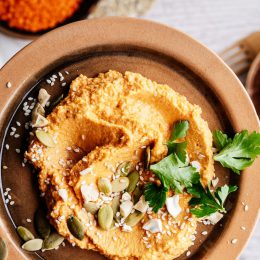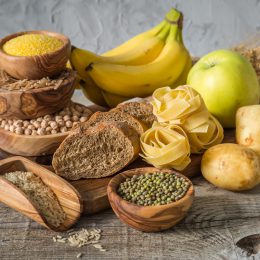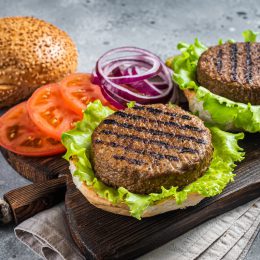The Top Holiday Health Myths—Busted!
Don’t believe everything you hear about the pitfalls of holiday eating. Nutrition pros set the record straight, so you can enjoy this special time of year.

The holiday season brings festive parties, family reunions, and time-honored traditions. It also ushers in cookies, egg nog, and pumpkin pie. As special occasions fill the calendar, myths about how this time of year harms your health swirl in real-life conversations and online. A lot of the so-called conventional wisdom about how to get through November and December without tanking your health goals simply isn’t true.
We talked to nutrition and fitness experts to learn more about which holiday-season health warnings are warranted—and which should be taken with a grain of salt. Learn how to separate holiday health facts from fiction, so you relish the season with no regrets.
Stay healthy during the holidays with SilverSneakers! Classes and events are happening right now at participating gyms, online through SilverSneakers LIVE, and at community centers near you. Activate your free online account to get started.
Common Holiday Health Myths That Don’t Add Up
These old chestnuts have one big thing in common: They encourage a negative diet mentality. “Believing these myths is not a healthy mindset,” says Grace Derocha R.D. She is a national spokesperson for the Academy of Nutrition and Dietetics. “Seasonal foods are tied to culture, tradition, and family. To make something that should be enjoyed filled with anxiety and deprivation is sad.”
This is the advice you shouldn’t follow.
- Exercise more to burn more holiday calories.
“The math here makes this a myth; it doesn’t add up,” says K. Aleisha Fetters, a certified strength and conditioning specialist and author of Fitness Hacks for Over 50. She notes that a generous slice of pie with whipped cream might top 500 calories.
“It would take most older adults more than two hours to burn that amount through exercise,” she says. Being smarter about your food choices in the first place is a much better idea than trying to exercise your way out of overeating.
- Swap your favorite seasonal treats with diet versions.
This strategy can backfire. “If it’s a low-fat, low-sugar, low-everything version of your favorite pie, you think you can eat as much as you want,” says Derocha. That means you likely eat more than if you’d fully enjoyed and been satisfied with one small slice, she says.
“A better strategy would be to cut down on your portion size,” says Michelle Dudash, R.D.N. “If you take all the good things out of a recipe, it won’t taste the same, and you’ll reach for something else later.”
- Eat as little as possible before a holiday feast.
Saving up all of your calories for a holiday meal pretty much guarantees that you’ll gorge yourself when you do pick up a fork, says Dudash. Instead of starving yourself all day, aim for a reasonable, balanced diet before — and after — the main event.
“It’s probably not the best day to hit the drive-through for lunch,” she says. Dudash recommends eating foods that contain protein, which is a nutrient that energizes you and keeps you feeling full. Eggs, yogurt, and beans all fit that bill.
- Carbs and sweets are what make you gain weight.
Its no secret that cookies and pie are calorie-dense foods. But you can’t gloss over the calorie content of the other things you’re putting in your mouth, says Dudash.
“Alcohol is a big one people forget about — almost any drink is going to contain 150 or 200 calories or more,” she says. “If you have more than one, it really adds up.” So if you’re reaching for grandma’s special-recipe gingerbread, you may want to take a pass on that mug of mulled wine.
- New Year’s resolutions will wipe the slate clean.
Just like adding in more exercise won’t instantly undo the damage of overeating, flipping the calendar won’t either. And if you’re considering a detox diet to get your weight on track, think again.
“The body naturally detoxes every day,” says Derocha. “It’s the kidney’s and liver’s main job.” For seniors, a typical detox diet doesn’t supply the protein that they need to prevent muscle loss, notes Dudash. Lean muscle helps keep your metabolism revving. When January rolls around, “the best thing to do is get back to your healthy routines,” she says.
The Holiday Eating Facts to Know
There are many truths that deserve more attention than the myths. Health experts want people to keep these things in mind over the holiday season — and all year long.
- People gain weight over the holidays.
This is a fact, but it’s not as bad as we’re led to believe: A review of research published in the Journal of Obesity showed that adults do gain weight between November and January — but only a pound or two. The experts say it’s nothing to stress over.
- Even short bursts of movement count as exercise.
Time is at a premium during the holidays, but that doesn’t mean you can’t fit in a brief workout. “Look for ways to fit in five minutes of movement,” says Fetters. She suggests doing wall push-ups while the coffee brews or taking an extra lap around the shopping center when picking out gifts. “You don’t have to change your clothes or break a sweat,” she says.
Find easy exercises to power up your day here.
- Many holiday dishes are packed with nutrients.
Celebration food isn’t all bad for you. Turkey breast, sweet potatoes, and Brussels sprouts are all healthy staples of the holiday table, according to the experts. Load up your plate with the dishes that have lean protein or plenty of fiber. If there’s salad on the table or at the buffet, pile that on your plate first, says Derocha. Eating more of the healthy stuff leaves less room for the treats on the dessert table.
Subscribe to our newsletter
It's quick and easy. You could be one of the 13 million people who are eligible.
Already a member? Click to discover our 15,000+ participating locations.
Follow Us
Recommended FREE SilverSneakers On-Demand Class: Healthy Holiday Nutrition
- Some holiday traditions are a good workout.
Don’t underestimate the opportunities for staying active that are baked into some holiday traditions. “Walk your neighborhood to check out the best lights and decorations,” says Fetters. “During family time, get down on the floor and play with the kids.” You can also go caroling, shop at local businesses instead of online, and walk with friends and family after meals.
Recommended reading: 8 Simple Ways to Stay Fit During the Holidays
- Positive resolutions are more successful.
As the holiday season winds down, many people turn their attention to January health tweaks. Experts agree that extreme or vague goals are likely to fail, but positive goals — resolutions that add something to your life — can set you up for success.
“Make them something enjoyable,” says Derocha, like cooking a new plant-based recipe every week. Fetters also recommends social fitness resolutions like trying pickleball or a standing walking date with a friend.
Recommended SilverSneakers Challenge: Take the Healthy Holidays Challenge With SilverSneakers
See our sources:
The effects of holiday eating on weight gain: Journal of Obesity
Check Your SilverSneakers Eligibility Instantly
SilverSneakers members can go to thousands of nationwide gyms and fitness locations, plus take SilverSneakers LIVE online classes that are designed for all fitness levels and abilities. If you have a Medicare Advantage plan, it may include SilverSneakers — at no additional cost. Check your eligibility instantly here.
Already a member? Get your SilverSneakers member ID and exclusive fitness and wellness content by activating your online account here.
Not eligible for SilverSneakers? You can still get 200+ free SilverSneakers On-Demand videos and stay in touch with us by creating your online account.





